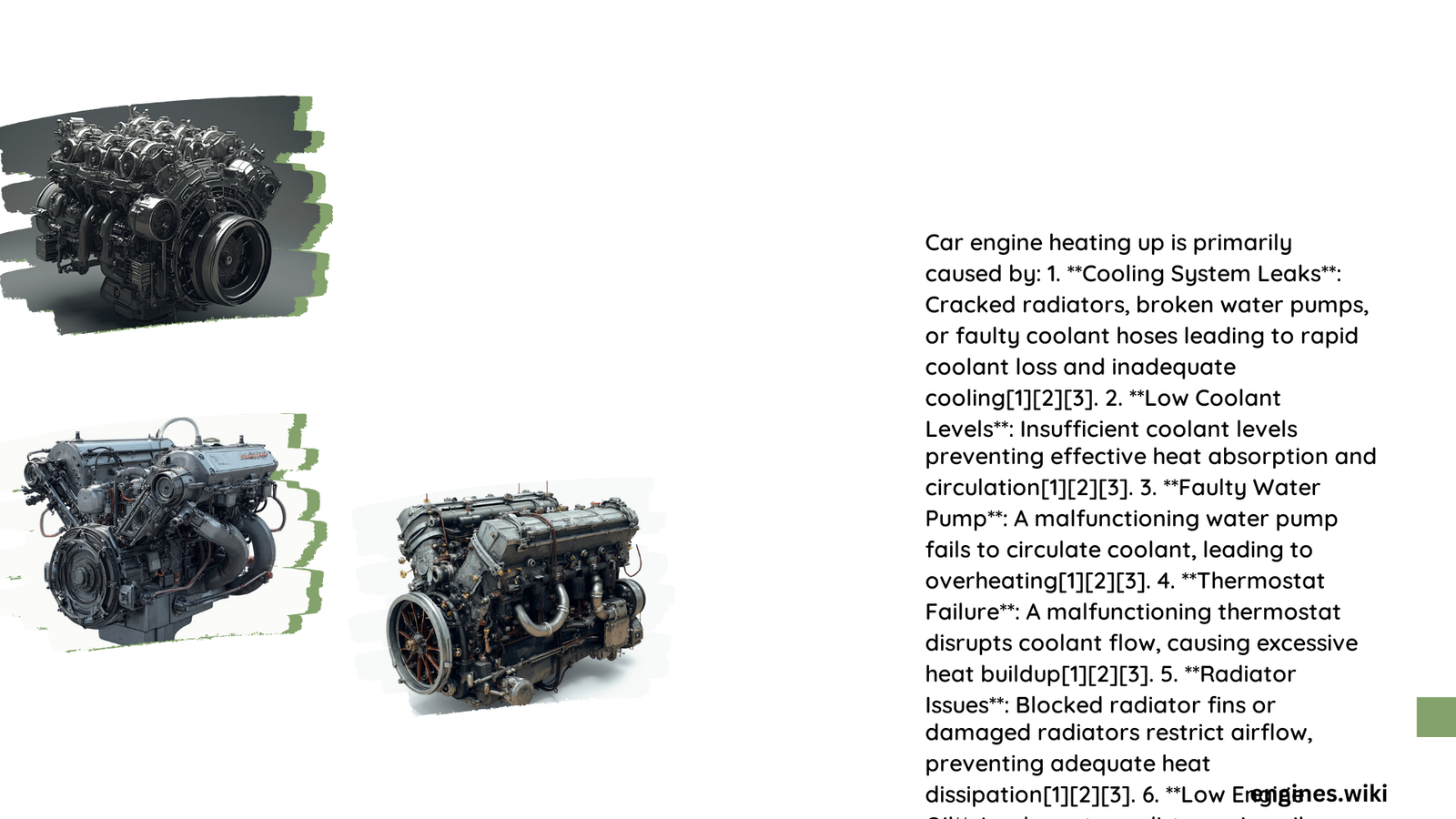Car engine overheating is a common issue that can lead to severe damage if not addressed promptly. The primary causes include coolant system failures, thermostat malfunctions, and mechanical issues. Understanding these factors is crucial for maintaining your vehicle’s health and preventing costly repairs. This article explores the various reasons behind engine overheating and provides practical solutions to keep your car running smoothly.
What Are the Main Causes of Car Engine Overheating?
Engine overheating can stem from several factors, both mechanical and environmental. Let’s delve into the primary culprits:
- Coolant System Issues
- Low coolant levels
- Coolant leaks
- Clogged radiator
-
Faulty water pump
-
Thermostat Malfunction
- Stuck in closed position
-
Incorrect temperature regulation
-
Mechanical Problems
- Damaged head gasket
- Faulty radiator fan
-
Broken drive belt
-
Environmental Factors
- Extreme ambient temperatures
- Heavy traffic conditions
- Towing or carrying excessive loads
How Does the Cooling System Contribute to Engine Overheating?

The cooling system plays a crucial role in maintaining optimal engine temperature. When it fails, overheating becomes imminent. Here’s a breakdown of cooling system components and their potential issues:
| Component | Function | Potential Issues |
|---|---|---|
| Radiator | Dissipates heat from coolant | Clogging, leaks, damaged fins |
| Coolant | Transfers heat from engine | Low levels, improper mixture |
| Water Pump | Circulates coolant | Worn impeller, bearing failure |
| Thermostat | Regulates coolant flow | Stuck closed or open |
| Hoses | Transport coolant | Leaks, cracks, collapse |
What Are the Signs of a Failing Cooling System?
- Temperature gauge reading high
- Steam from under the hood
- Sweet smell (from coolant leaks)
- Puddles under the car
- Decreased engine performance
Why Does Low Coolant Level Cause Engine Overheating?
Coolant, also known as antifreeze, is the lifeblood of your engine’s cooling system. When coolant levels drop, the following issues arise:
- Insufficient heat transfer from engine components
- Air pockets in the cooling system, reducing efficiency
- Increased stress on remaining coolant
- Potential damage to water pump due to cavitation
To prevent low coolant levels:
– Regularly check coolant levels
– Inspect for leaks
– Follow manufacturer’s recommendations for coolant type and mixture ratio
How Does a Faulty Thermostat Lead to Engine Overheating?
The thermostat acts as a gatekeeper for coolant flow. When it malfunctions, it can cause:
- Stuck Closed: Prevents coolant from reaching the radiator, leading to rapid overheating
- Stuck Open: Causes the engine to run too cool, reducing efficiency and potentially leading to overheating under high loads
Signs of a faulty thermostat include:
– Fluctuating temperature gauge readings
– Engine taking longer to warm up
– Reduced fuel efficiency
What Role Does the Radiator Play in Preventing Engine Overheating?
The radiator is the primary heat exchanger in your car’s cooling system. Its efficiency can be compromised by:
- Clogging: Debris and mineral deposits can restrict coolant flow
- Leaks: Small holes or cracks can lead to coolant loss
- Damaged Fins: Bent or broken fins reduce heat dissipation
To maintain radiator health:
– Flush the radiator periodically
– Use proper coolant mixture
– Protect the radiator from physical damage
How Can Environmental Factors Contribute to Engine Overheating?
While mechanical issues are often the primary culprits, environmental factors can exacerbate or even cause overheating:
- High Ambient Temperatures: Increase the baseline temperature the cooling system must overcome
- Stop-and-Go Traffic: Reduces airflow through the radiator
- Climbing Steep Grades: Puts additional strain on the engine
- Towing Heavy Loads: Increases engine workload and heat generation
Tips for managing environmental factors:
– Use the appropriate coolant for your climate
– Ensure proper airflow to the radiator
– Avoid overloading your vehicle
– Plan routes to minimize extreme conditions when possible
What Are the Consequences of Ignoring Engine Overheating?
Ignoring an overheating engine can lead to severe and costly damage:
- Warped Cylinder Head: Alters engine geometry, leading to compression loss
- Blown Head Gasket: Causes coolant and oil mixing, leading to engine failure
- Cracked Engine Block: Often results in total engine replacement
- Seized Engine: Complete engine failure requiring replacement
Early detection and prompt action are crucial to prevent these outcomes.
How Can You Prevent Car Engine Overheating?
Preventing engine overheating involves regular maintenance and attentive driving:
- Regular Coolant Checks: Maintain proper levels and mixture
- Scheduled Maintenance: Follow manufacturer recommendations for cooling system service
- Prompt Repairs: Address leaks and malfunctions immediately
- Radiator Care: Keep it clean and free from debris
- Mindful Driving: Be aware of your vehicle’s temperature gauge, especially in extreme conditions
By understanding the causes of car engine heating up and taking proactive measures, you can significantly reduce the risk of overheating and extend the life of your vehicle’s engine.
